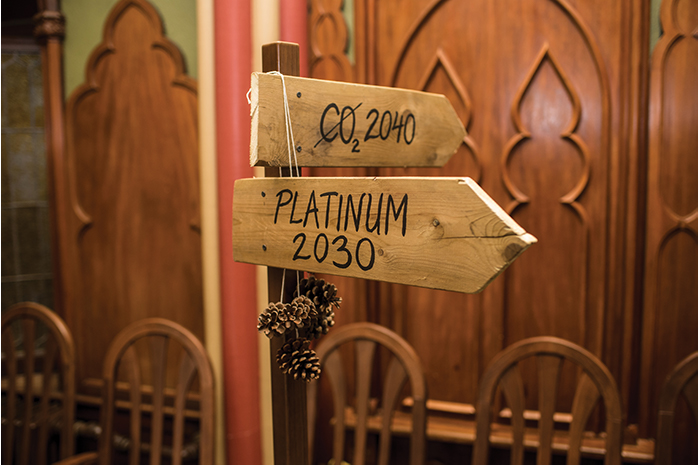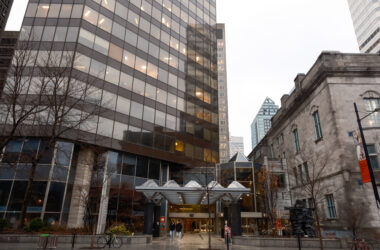On Dec. 1, McGill University launched its Climate and Sustainability Action Plan. As the product of the Vision 2020 Sustainability Strategy’s consultations with over 500 McGill community members, the Action Plan outlines two long-term goals for the university: Obtaining a Platinum Ranking from the Sustainability Tracking, Assessment and Rating System (STARS)—an organization that assigns institutions sustainability scores based on their environmental performance—by 2030, and achieving carbon-neutrality by 2040. Last year, McGill earned a Gold ranking from STARS for increasing its integration of sustainability in curriculum, research, dining services, and purchasing.
Beyond these primary goals are a multitude of more specific action items, like the promotion of sustainable modes of commuting through the introduction of a new bike centre, upgrading the heating, ventilation, and air conditioning (HVAC) and electrical systems in old buildings, and electrifying McGill’s fleet of vehicles. At the launch event, staff from the McGill Office of Sustainability outlined McGill’s sustainability strategy for the coming years.
When strategizing the Action Plan, McGill Sustainability Director François Miller strove for pragmatism. He intends to provide students, faculty, and administrators with recommendations to inspire community involvement, which is crucial for ensuring the Plan’s success.
“We’re both serious and humble in what we are presenting in this Climate and Sustainability Action Plan,” Miller said. “These are not just dreamy ideals that we are putting there. We have a concrete action plan to achieve those long-term targets, but we are humble in the sense that we know this goes beyond what the Office of Sustainability can do. We need the involvement of the students and staff and faculty members in order to achieve these targets.”
Vision 2020 Coordinator Amelia Brinkerhoff hopes that students will be excited about the proposed changes, and continue acting to mitigate carbon emissions on McGill campuses.
“We’re going to have more green buildings on campus, a better waste system on a campus, a bike centre on campus,” Brinkerhoff said. “These are more immediate, visible things [but] I think the important thing to realize is that it is a long process. 2040 is 23 years away. I think this is about being aware that change takes some time, and that change management can be difficult.”
Post-Graduate Students’ Society (PGSS) Environment Commissioner Konstantina Chalastara sees her role in the Action Plan to be promoting small-scale sustainable practices among post-graduate students.
“What I will try to do is to show to graduate students that small things can make a big difference,” Chalastara said. “My goal for Vision 2020 is to promote [these small things]. It could be for your research, or how you travel. I think the main point here is that research and graduate studies have a big environmental impact. If you work in a lab, you have a lot of waste, so I’m trying to prove that you can recycle even in a lab.”
Brinkerhoff further hopes that McGill students will continue putting forth their own sustainability-related initiatives in the coming years.
“[The Action Plan is] for us, but it’s also for [students] as a learning experience,” Brinkerhoff said. “So they should feel some sense of ownership and some sense of implication, and that they are free to get involved and get in touch with [the McGill Office of Sustainability] if they have an idea. We have a lot of tools to help students who have ideas, so I hope that people do feel inspired to act, and to get more involved, and to learn from this system that is McGill.”









